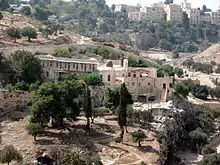St. Onuphrius Monastery
The St. Onuphrius Monastery is an Orthodox monastery for women located in the potter's field (Akeldama in Aramean) that Judas Iscariot purchased with thirty pieces of silver obtained by betraying Jesus. The location is south of East Jerusalem and on the southern slope of the Gehenna valley, close to the Kidron Valley. Subject to the Greek Orthodox Church of Jerusalem, it is named after the fourth-century anchorite monk Saint Onuphrius.[1]

History
.jpg.webp)
The monastery was built in 1892 on the site of an early Christian graveyard, consisting of niches hewn into the rock face; during the fourth century, this is where Saint Onuphrius the Anchorite would sit in prayer. In addition to the cave occupied by Saint Onuphrius, there is the Cave of the Apostles, where the Apostles are said to have hidden during the Crucifixion.[2] An underground church has existed since the time of Constantine I (306–312), and has been enlarged over the centuries. It has been consecrated to Saint Onuphrius, with the grottoes found in the southern part of the church. From this period, the Orthodox have conserved the custom of dedicating a number of funeral chapels to Saint Onuphrius.[3]
The present monastery was built in the nineteenth century.[1] It includes terraces that dominate the floor of the valley.
Gallery
 Main approach
Main approach Entry terrace
Entry terrace Approach road and garden of the monastery
Approach road and garden of the monastery Columbarium niches
Columbarium niches
References
- Святая Земля. Исторический путеводитель по памятным местам Израиля, Египта, Иордании и Ливана / Ред. М. В. Бибиков. — М., 2000. — С. 80—81.
- Тимаев Н. Иерусалим и Палестина. — Гл. 75.
- Ангел Гробниц или история разрушенной святыни. Библиотека официального сайта Спасо-Преображенского Соловецкого ставропигиального мужского монастыря Archived 2009-01-30 at the Wayback Machine
Bibliography
- (In Russian) Archimandrite Léonide (Kavéline), La vieille ville de Jérusalem et ses environs, Indrik, 2008.
Source
- Translated from French, which in turn was transl. ru – transl. Монастырь Онуфрия Великого (Акелдама)